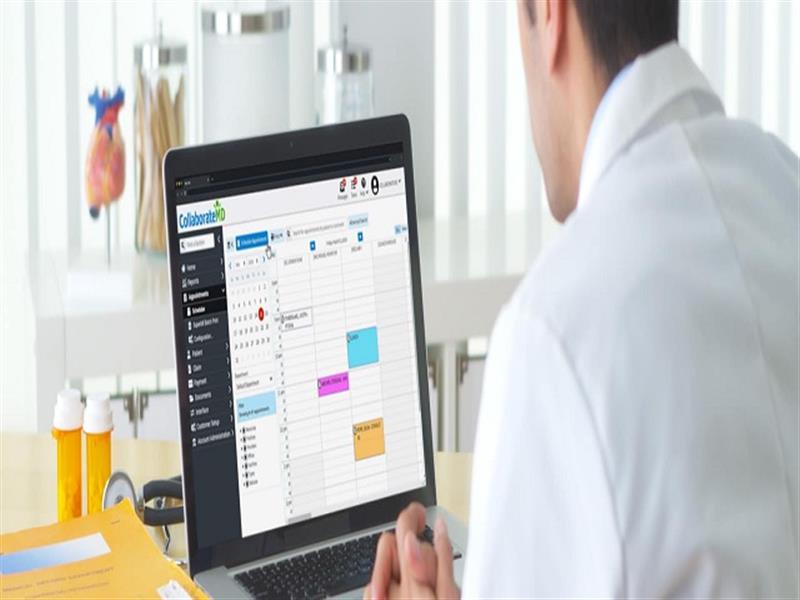
Healthcare is undergoing a transformation thanks to software solutions that improve patient care, increase operational efficiency, and promote better teamwork among medical workers. The industry is heading toward a future where technology and human expertise collaborate to produce better healthcare results, whether through EHRs, telemedicine, AI, or mobile health apps.
We are about to witness a renaissance in the healthcare sector that will influence it for years to come, enhancing not just the way we receive care but also how we perceive and take care of our health as a result of ongoing technological advancements.
Since it ensures the health of both individuals and communities, the healthcare sector has long been a pillar of the community. The use of software solutions in healthcare has transformed patient care, operational effectiveness, and overall healthcare delivery as technology develops. Healthcare is evolving into a more connected, individualized, and data-driven industry with the introduction of electronic health records (EHRs) and AI-driven diagnoses.
1. Electronic Health Records (EHRs) and Patient Management Systems
The use of Electronic Health Records (EHRs) has been one of the biggest developments in healthcare. The days of having to go through mountains of documentation to get a patient's medical history are long gone. EHRs offer a centralized digital database where approved healthcare providers can view and securely store patient data.
In addition to increasing accuracy and guaranteeing that important information, including as allergies, prescriptions, and prior diagnoses, is readily available during consultations, these systems expedite the process of collecting and organizing patient data. This lowers the possibility of medical errors and facilitates quicker, better-informed decision-making.
EHRs also facilitate improved communication between various healthcare providers, guaranteeing that patients receive the same level of treatment even if they visit several facilities or experts.
2. Telemedicine and Remote Patient Monitoring
The field of telemedicine has revolutionized healthcare, particularly in the wake of worldwide crises such as the COVID-19 epidemic. Patients can consult with medical experts from the comfort of their homes using telemedicine software, which reduces travel requirements, wait periods, and the possibility of infection in clinics.
Doctors may monitor patients with chronic illnesses like diabetes or hypertension using Remote Patient Monitoring (RPM) systems, which go beyond simple consultations. Health providers can monitor real-time health data collected by wearable devices, such as blood pressure, glucose levels, and heart rate. This makes it possible to identify possible problems early and to take appropriate action, which frequently eliminates the need for hospital stays.
3. AI and Machine Learning in Diagnostics and Treatment
Software for healthcare is increasingly incorporating machine learning (ML) and artificial intelligence (AI) to improve treatment planning and diagnosis. AI-powered technologies can spot patterns in patient data that may not be apparent to the human eye by evaluating enormous volumes of data.
AI algorithms, for example, are being used to evaluate medical pictures with remarkable precision, including MRIs, CT scans, and X-rays. These algorithms are sometimes even more accurate than human radiologists in identifying early symptoms of diseases like cancer or neurological problems.
4. Healthcare Data Analytics
Providers of healthcare produce massive volumes of data. The emergence of data analytics tools has made it possible to utilize this information to enhance patient care and expedite processes. Healthcare firms can make data-driven decisions by examining patient demographics, treatment outcomes, and operational inefficiencies.
One effective example is predictive analytics, in which software forecasts illness outbreaks, hospital admission rates, or even the patients most likely to develop a particular ailment. These insights help healthcare practitioners better allocate resources, anticipate problems before they arise, and save healthcare costs.
5. Mobile Health Apps
The proliferation of mobile health apps that enable people to take charge of their health is a result of the growing use of smartphones. These applications offer a multitude of features, ranging from monitoring food and exercise routines to treating long-term illnesses.
Through smartphone apps, patients may make appointment requests, view test results, and have direct communication with healthcare providers. Furthermore, applications that let users track their symptoms or receive prescription reminders help patients stick to their treatment programs better, which improves health outcomes.
6. Blockchain for Secure Health Data
As healthcare data becomes more digitally connected, security and privacy issues are rising to an unprecedented level. Let's talk about blockchain technology. Blockchain provides a safe, decentralized method for exchanging and storing medical records, lowering the possibility of data breaches and guaranteeing patient privacy.
Patients may decide who gets access to their health information and maintain ownership over their medical data thanks to blockchain technology. When patients are switching between hospitals or seeing different experts, this system makes sure that data exchange between healthcare providers is unchangeable.
7. Improved Administrative Efficiency
Healthcare workers' time is frequently greatly consumed by administrative duties such as scheduling, invoicing, and coding, which takes away from their ability to provide quality patient care. Administrative procedures are becoming more effective with the use of revenue cycle management systems and practice management software.
These technologies streamline operations and cut down on errors by automating processes including medical billing, appointment scheduling, and claims processing. Consequently, healthcare providers can save expenses, boost profits, and commit more time to patient care.
8. Collaborative Care Platforms
Multidisciplinary teams frequently collaborate to handle complicated problems in modern healthcare. By facilitating the easy sharing of patient data, collaborative care systems let healthcare providers—such as doctors, nurses, pharmacists, and specialists—to communicate with one another.
These platforms encourage a more complete approach to therapy, in which all medical professionals can share their knowledge to create a detailed care plan. By working together, we can guarantee that patients receive comprehensive care while lowering the possibility of misunderstandings or needless procedures.